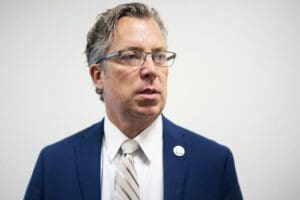206 House Republicans vote to prevent FAA from studying climate change
Tennessee Republican Rep. Andy Ogles’ amendment would have barred federal studies of aviation turbulence from focusing on climate change.

Two hundred and six House Republicans voted unsuccessfully on Wednesday night to insert an amendment into a Federal Aviation Administration reauthorization bill that would have required that the words “climate change” in the bill be replaced with the word “weather.”
Referring to the requirement that the FAA study air turbulence, Tennessee Republican Rep. Andy Ogles, who introduced the amendment, said: “As part of this, it requires the agency to conduct R&D to understand the impacts of climate change and other factors on the nature of turbulence. My amendment changes this requirement to focus on the impacts of weather rather than climate change. Weather patterns are a common cause of turbulence.” Ogles’ amendment was intended “to clarify that a study of turbulence should include a focus on weather conditions rather than climate change since weather is the proximate cause.”
Had it passed, the amendment would have limited the agency’s study of increased aviation turbulence to focusing solely on the weather, rather than the underlying cause of higher air temperatures.
With all 211 Democrats who were present and 16 Republicans voting no, the House narrowly defeated the amendment 206-227.
The world is facing record-setting extreme heat, and scientists say climate change is the cause. “At this point, there aren’t any unprecedentedly extreme heat events on Earth that haven’t been exacerbated by climate change,” University of California, Los Angeles climate scientist Daniel Swain told USA Today on Wednesday.
A study by researchers at the University of Reading in the United Kingdom found that warmer air brought about by climate change has significantly increased the amount of severe turbulence encountered by airplanes flying over the North Atlantic since 1979.
“Following a decade of research showing that climate change will increase clear-air turbulence in the future, we now have evidence suggesting that the increase has already begun,” study co-author and atmospheric scientist Paul Williams told the Guardian. This means bumpier, more expensive, more dangerous air travel.
But Ogles, a first-term lawmaker who made headlines in February for having lied about his resume and falsely claimed to be an economist during his 2022 campaign, sought to stop similar research by the U.S. government. In a floor speech, he told colleagues:
The definition of climate change is a long-term event. A flight and turbulence would be a short-term occurrence. So what we’re talking about is weather in a moment, on a duration of a flight, and how it impacts said flight. It’s changing weather, not climate change, that’s to blame on your flight to and from D.C., Mr. Speaker. We don’t measure climate change over duration of a flight. But this is what we’re talking about, the duration of a flight. Turbulence that impacts flights while they’re in the air. As we develop a better understanding of how the weather impacts turbulence, people may better understand how instances of turbulence might differ under different times. And again, Mr. Speaker, what we’re trying to say is, let us not allow agendas to slip into the mission.
Democratic Georgia Rep. Hank Johnson responded:
Long-term weather patterns affect turbulence, and that’s what we need to study. We should not deny that there will be long-term effects of climate change. We should not ignore the fact that climate change is real and is happening today. So to force our government to not look at these weather patterns long-term is very short-sighted. Let’s plan for this turbulence as we come to grips with climate change.
Ogles then said: “The FAA is busy enough. They’ve got enough on their hands. It makes sense to study weather patterns and to study turbulence. It does not make sense to allow woke ideologies to slip into the mission statement of an agency whose primary charter is to keep those in the air safe.”
Ogles recently dismissed the impact climate change has had in spurring wildfires, causing smoke that has polluted U.S. cities. He blamed possible arson and lightning strikes instead for wildfires in Canada.
On Feb. 2, he and 23 Republican colleagues introduced a bill called the Inflation Reduction Act of 2023, which would repeal the Inflation Reduction Act of 2022. The law he seeks to eliminate includes $369 billion in clean energy and environmental infrastructure funding.
While the Ogles bill has not advanced out of committee, House Republicans in April passed a separate bill, on a 217-215 vote, that would rescind most of the Inflation Reduction Act’s climate change-related investments. Majority Leader Chuck Schumer said the bill would be dead on arrival in the Senate.
The FAA authorization bill, known as the Securing Growth and Robust Leadership in American Aviation Act, passed on a bipartisan 351-69 vote on Thursday morning. Ogles voted no.
Published with permission of The American Independent Foundation.
Recommended

President Biden visits Prince William park to talk solar, youth involvement on Earth Day
Virginia set to receive $156 million from U.S. Environmental Protection Agency program
By Charlie Paullin, Virginia Mercury - April 23, 2024
Texas governor and attorney general do little to curb state’s chemical plant crisis
Republicans Greg Abbott and Ken Paxton have taken thousands of dollars in donations from chemical companies and their affiliated PACs.
By Jesse Valentine - December 08, 2023
‘We’ve been waiting for this’: Union workers cheer Biden’s hydrogen hub plan
Federal funding for the hub is estimated to bring over 20,000 jobs to the Pennsylvania-New Jersey-Delaware area.
By Anna Gustafson - October 17, 2023









































































